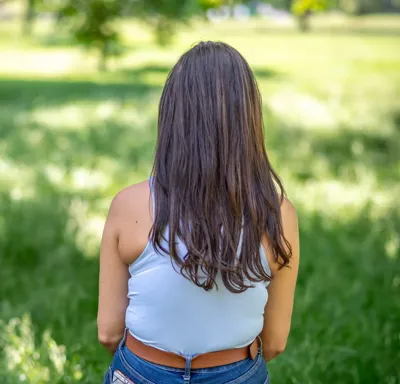“I’m still waiting” – Molly’s story
15/09/2025
Molly has been waiting for mental health treatment frequently and for very long periods of time. She speaks up on the critical impact this had on her complex post-traumatic stress disorder (C-PTSD).
I’m 25 years old and for as long as I can remember, I’ve been the one who speaks up, especially for young people. I advocate for their safety, their voices, their right to be heard at every level. There’s a reason I care so deeply about this: I’m a survivor of domestic violence and childhood abuse. From an early age, protecting others felt like the only thing I knew how to do because I was never protected myself.
My mental health journey began long before I ever had the words to describe it. I can't recall a time when I wasn’t grappling with something beneath the surface. Depression became a familiar companion in my early teens. But back then, no one really asked what was going on. Teachers and doctors dismissed it as “just being a teenager.” If even one adult had asked the right question and really listened, I might have opened up. I might have gotten help sooner, not have suffered so long in silence.
Because that silence? It festered. Without support, my pain turned inward—manifesting as self-harm and what I now understand to be complex post-traumatic stress disorder (C-PTSD). I wasn’t referred to CAMHS (Child and Adolescent Mental Health Services), and when I eventually accessed adult services, the professionals I met were shocked I’d gone unnoticed for so long.
At 19, everything changed. I was living abroad and had access to private healthcare for the first time. There, I met a psychiatrist who didn’t just treat symptoms, but saw me. We worked together for 18 months, week by week, rebuilding my sense of self and safety. For the first time, I believed I could live a life that wasn’t defined by trauma.
But when I returned to the UK, everything started to crumble. The first thing I did was refer myself to NHS talking therapies. I was met with a 12-month waiting list. I moved to university hoping for a fresh start, but instead faced the same battle again— another long wait, and this time, the system was overwhelmed. I wasn’t alone in struggling, but I felt completely isolated.
The PTSD returned with force. The progress I’d made began to unravel. I struggled every day just to get out of bed. I completed a short six week CBT (cognitive behavioural therapy) course, but it focused on loneliness, not the depression or PTSD that consumed me. As a first-generation, estranged student, I felt invisible. Eventually, I made the painful decision to leave university.
From 2021 to 2023, I received just six weeks of mental health support. That’s it. Things got worse. I started experiencing suicidal thoughts. Desperate, I reached out—charities, NHS services, private therapists—anyone who might listen. Most didn’t. But one person did: a receptionist at a local charity. She got me in touch with the crisis team, a service I hadn’t even known existed. Until then, I thought it was either your GP, talking therapies, A&E, or...nothing.
The crisis team became my lifeline. For six weeks, they showed up for me every single day. They helped me get out of bed, put on clothes, brush my teeth, leave the house. They listened. They cared. For the first time in a long time, I felt human again.
Afterwards, I was referred back to tier two services. I sat across from a clinician and was told I had OCD (obsessive compulsive disorder) and BPD (borderline personality disorder). They promised treatment. That was seven months ago. I’m still waiting.
The only reason I’ve not relapsed is that I’ve found healing in unexpected places. In the quiet rituals of routine. In the warmth of sunlight on my face. In the strength of friendships that remind me I'm not alone. I’m still recovering, slowly, but I’m still here.
And that’s why I advocate. Because no one should have to go through this alone. Because the system needs to hear our stories in order to change.

